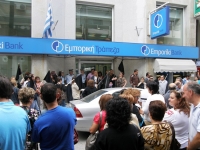EuroZone Profiteers: Crédit Agricole
Ready to Forget Cautious Lessons About Banking

What:Crédit Agricole. Founded in 1894. It is majority owned by 39 state-organized regional cooperative banks and had assets worth €2.43 trillion in 2011. Pauget was appointed CEO of Crédit Agricole in late 2005. Just before Christmas, he met with a reporter from the Financial Times in the lounge of the Plaza Athénée luxury hotel in Paris to talk about the bank’s ambitious new strategic plan to invest outside the country. “We know that we can expect to do acquisitions in countries where we know people,” he confidently told Banker magazine two months later. [123] [122] Arnold, Op. Cit. [123] Brian Caplen and Nick Kochan, “Moving Beyond Domestic Bliss,” The Banker, June 2, 2006. http://www.thebanker.com/World/Western-Europe/France/Moving-beyond-domestic-bliss [124] New York Times, “Credit Agricole is Hungry for Emporiki Bank of Greece,” New York Times, June 13, 2006. http://dealbook.nytimes.com/2006/06/13/credit-agricole-is-hungry-for-emporiki-bank-of-greece/ [125] Caroline Muspratt, “Credit Agricola Bids for Greek Emporiki,” Daily Telegraph (UK), June 14, 2006. http://www.telegraph.co.uk/finance/2941052/Credit-Agricole-bids-for-Greeces-Emporiki.html [126] Speech by Panos Leivadas, Secretary General of Information Hellenic Republic at the 8th Annual Capital Link Forum on November 17, 2006 in New York city. Slides can be seen here: http://forums.capitallink.com/greece/2006/pres/leivadas.pdf [127] Vidya Ram, “Credit Agricole’s Spanish Blunder?,” Forbes, November 19, 2007. http://www.forbes.com/2007/11/19/bankinter-credit-agricole-markets-equity-cx_vr_1119markets30.html [128] Doyle, Op. Cit. Caplen and Kochan, Op. Cit. [129] Doyle. Op. Cit. [130] Crédit Agricole S.A., “Crédit Agricole S.A. Acquires 15 per cent of Bankinter for €809 Million,” Crédit Agricole press release, November 19, 2007. http://www.ca-cib.com/medias/DOC/68167/2007_1911_en_casa_bankinter.pdf [131] Market Watch, “Credit Agricole to Buy 19.53% of Bankinter,” Market Watch, November 19, 2007. http://www.marketwatch.com/story/credit-agricole-to-buy-1953-of-bankinter [132] Vanessa Singh, “Calyon Builds Credit Markets and CDO Team,” Financial News, December 27, 2006. http://www.efinancialnews.com/story/2006-12-27/calyon-builds-credit-markets-and-cdo-team-1?ea9c8a2de0ee111045601ab04d673622 [133] Elizabeth Collins, “Top Honours for AB InBev & Novo Nordisk,” Morningstar, November 22, 2012. http://www.morningstar.co.uk/uk/news/96834/top-honours-for-ab-inbev—novo-nordisk.aspx and European CEO, “Profiles: George Pauget,” EuropeanCEO, November 25, 2009. http://www.europeanceo.com/profiles/2009/11/george-pauget-crdit-agricole/ [134] Fabio Benedetti-Valentini, “Credit Agricole Seeks an End to its Greek Imbroglio,” Bloomberg, June 13, 2012. http://www.bloomberg.com/news/2012-06-12/credit-agricole-seeks-an-end-to-its-greek-imbroglio.html [135] Scheherazade Daneshkhu, James Wilson and Patrick Jenkins, "France and Germany in the line of fire," Financial Times, February 10, 2010. http://www.ft.com/intl/cms/s/0/8038d17e-167d-11df-bf44-00144feab49a.html, BBC, "Credit Agricole hit by sub-prime," BBC, March 5, 2008. http://news.bbc.co.uk/2/hi/business/7278702.stm and Elisa Martinuzzi, Fabio Benedetti, et al. Op. Cit [136] Paul Betts, “Credit Agricole Chief Brings Banking Industry to Book,” Financial Times, November 9, 2009. http://www.ft.com/intl/cms/s/0/8c04b92c-cd6d-11de-8162-00144feabdc0.html [137] Christian Plumb and Andrea Mandala, “Credit Agricole Wrestles with Italy Loan Unit Losses,” Reuters, December 20, 2012. http://www.reuters.com/article/2012/12/20/agricole-italy-idUSL5E8NJ42020121220
Where: Paris, France.
Why: It privatized in 1988, and spent heavily buying banks in Central and Southern Europe. It lost €5.3 billion on Emporiki bank in Greece.
Outcome: It took €3 billion in bailout funds from French government in 2008, and sold Emporiki in October 2012 to Alpha bank for €1.
"We are not just in France. That is not a real view of our position," Pauget told the reporter, and he was “ready to forget the cautious lessons about banking deals” that he once taught as an economics professor—if the right opportunity came along.[122]
Pauget spoke of the €5 billion he was prepared to spend, noting that he no longer considered investment banking a risky, peripheral activity, but an essential element of success.
In June 2006, Pauget pounced on Emporiki Bank of Greece, offering €3.1 billion in cash to take it over.[124] A little more than two years after Bouton had bought Geniki, Pauget’s move was still considered a bold move given that Emporiki was the least profitable of Greek banks at the time.
But Emporiki appeared to have potential as the fourth largest residential mortgage provider and the fifth largest consumer credit provider with about 10 percent of the Greek market share. "People in Greece have an average of 2.5 banking products per person, so there is a lot of opportunity,” the French bank said in a press release at the time. “In France the average is seven to nine products per person."[125]
And like Tournebize, Pauget believed that Greece was a gateway to the region. “One can no more understand the vigor and the potential of the Greek economy simply in terms of its 10 million citizens; instead, one must look at it as being inseparable from the broader region’s economies,” he was quoted saying in 2006.[126]
Greece’s biggest foreign investment, the Emporiki sale sparked a strike among Greek employees worried that the new owners would fire many of them. Meanwhile, experts raised serious doubts about the purchase. “The price paid is quite high," said Pierre Flabbee, an analyst at Landsbanki in Paris, told Forbes at the time.[127]
The Greek finance ministry waved it through.
In the heady years from 2005 to 2007, most other large banks were buying, merging, and expanding as quickly as possible. Going with the trend, Pauget bought up other banks—including Egyptian American Bank in Cairo and Banca Intesa Sanpaolo in Italy—spending almost twice as much as he initially suggested (€9 billion) in 2006 alone.[128] He even considered buying Alliance & Lester in the U.K. at the vastly inflated price of €7 billion. Given that it was valued at £1.33 billion (€1.64 billion) just two years later, the purchase would have been a complete disaster.[129]
In 2007, Pauget arranged to buy a 15 percent share of Bankinter—Spain’s sixth largest bank at the time. The sale made Crédit Agricole one of Bankinter’s most significant minority owners.[130]
Again, commentators expressed surprise. "With Bankinter, Crédit Agricole has made a good choice, but the price they are paying seems steep," Pierre Flabbee, analyst at Landesbanki Kepler told Forbes.[131]
Crédit Agricole was growing at breakneck speed, expanding its investment banking operations, and opening offices in Eastern Europe, East and South Asia, the Middle East, North Africa, and the U.S. It sold CDOs and other debt instruments, including mortgage-backed securities.[132]
Financial analysts from Morningstar would later refer to Pauget’s spree as “empire building,” but at the time, he was seen as able “to make tough decisions … to steer the bank through troubled waters and the mettle to handle the pressure at the top,” according to European CEO magazine.[133]
A number of these investments went sour quickly. Emporiki made a decent profit in 2007.[134] But every subsequent year Emporiki continued to lose heavily. In 2009, Emporiki took another €485 million impairment provision. By the time it sold the bank for €1 in October 2012, Crédit Agricole had lost €5.3 billion on Emporiki. Crédit Agricole’s investments in the U.S. real estate market were also catastrophic.[135]
After the crisis hit, Pauget eventually succumbed to an insurrection inside the bank, and resigned in 2010. But not before he wrote a book to defend his role. In Should We Burn the Bankers?—he blamed regulators and central banks for the global credit meltdown. It was quickly followed by a second book, The Post-Crisis Bank. [136]
Despite Pauget’s efforts to redeem himself through writing, his legacy seems fixed in failure. "Crédit Agricole SA has destroyed more shareholder value through international expansion than any bank in Europe," one London-based analyst speaking on condition of anonymity told Reuters in December 2012.[137]
- 104 Globalization



